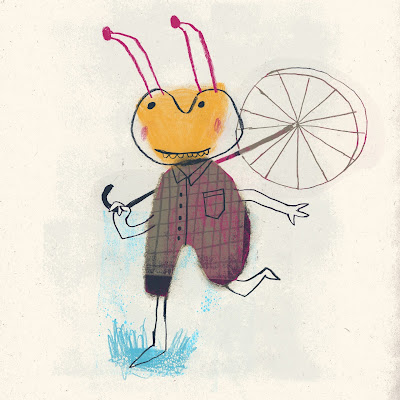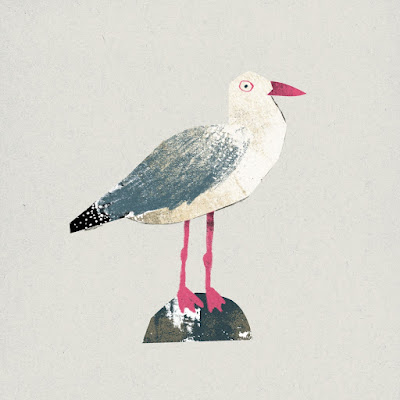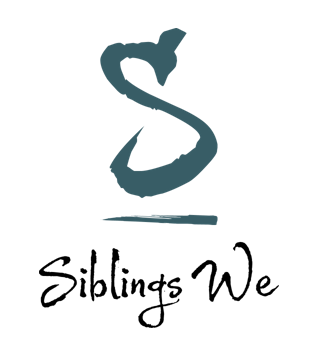 Name: Dave Petzold
Name: Dave Petzold
Describe your illustration style in ten words or less.
A smudgy jumble of collaged shapes and lines
What items are an essential part of your creative space?
Graphite pencils, music, lightbox, scanner, Photoshop, Plants, water, ink, brushes and rollers, Wacom tablet, charcoal and random beach finds (mostly pebbles and feathers).
Do you have a favourite artistic medium?
8B pencil is my favourite, mostly for doing line work and initial sketching. I love the variety of mark making that it offers, depending on how you use it. Line work is such an integral part of my style that it’s important that I can put a lot of expression into it. I’ve tried a few different brands of 8B and the only one I like is Mars Lumograph Black. I also love using ink and rollers to make textures and oil paint in its various forms. I learnt an amazing oil paint and pastel transfer technique from Jesus Cisneros, during a workshop a couple of years ago, the results can be so random and textured, I love it.
Oh, there’s so many but the three artists that I looked up to when I first started (and I still do) are Beatrice Alemagna, Jesus Cisneros and Joohee Yoon.
Which artistic period would you most like to visit and why?
I like the Dada movement, the Surrealists, Expressionism and Cubism. If I had to choose one I’d like to visit Europe during the Surrealist movement.
My grandparents had a huge influence on me when I was young. My grandpa was an engineer and an artist who worked with leather and wood and occasionally dabbled in opal polishing, diamond faceting and taxidermy. My grandma loved gardening and grew fruit trees, cooked amazing German food and often talked to Cocky, her rose-breasted galah. Their home in Adelaide was filled with heirlooms and trinkets that had travelled with them when they emigrated from Munich in the late ‘50s and as a boy, I loved spending time in that wonderfully strange and eclectic world.
I remember a cuckoo clock hanging in the hall and an unfinished wooden carving of a Clydesdale rearing up on its hind legs. My favourite place was the garage. I’d squeeze past the old Holden and plonk myself down at grandpa’s drafting table. The small studio invited imagination with its juxtaposition of weird objects. On the back wall, hanging above an assortment of formaldehyde insects was a red taxidermy crab with one huge claw and in a corner sat a piano accordion and an opal polishing wheel.
But I think the biggest influence was seeing my grandpa’s drawings for his leatherwork. I’d look through his bird books and find sketches tucked away in the pages and I can still feel that excitement of finding a little scrap of paper with his scribbled notes. I don’t think they realised it but this is where the seeds of my imagination were planted. Through them I gained a love of making things, exploring and above all, being curious.
I have two work spaces, one for painting and the other for scanning and compiling the artwork. They are in the same room but separate from each other as the painting desk gets very grubby so I try to keep all that good, messy stuff away from the computer. I have lots of inspiration on the walls, as well as rough workings and ideas. Lots of plants, too.
What is your favourite part of the illustration process?
Oh, that’s a tough one. I think the initial stages when I’m messing around with charcoal or ink, trying to work out what the illustration will be. A lot of my illustrations, particularly characters, come from exploration and I’m often guided by the medium, letting charcoal smudge or oil paint splodge in a certain way – not trying to control things too much. Some interesting things usually come from that. I also love working solely with graphite pencil, creating the line work, as I mentioned earlier. There’s something simple and immediate about just picking up a pencil and drawing.
Yeah, it can be pretty tough and overwhelming when you’re starting out. I would say one of the most important things is get an online presence of some kind, whether it’s a website or an instagram page, where you can show your work. Also, search out conferences, make connections, talk to people and ask lots of questions.
Speaking of work, one of best pieces of advice I ever read was from Rebecca Green. I think she has a blog post about this, but essentially you create a list of dream projects that you’d like to be working on, if you were a full-time illustrator. The idea is to put all the dream projects into a jar and to pull one out each day or week – whatever suits – and work on it. At the end of a few months you’ll have a bunch of work that you can showcase on your website or social media. If you’re a bit light on for work this can really help you bolster your portfolio. Another great thing that comes from doing this practice is that it helps you to hone your drawing skills and become more comfortable with your style.
Dave Petzold is an illustrator and author living on Bundjalung Country in Lennox Head, New South Wales. His debut picture book, Seven Seas of Fleas (Starfish Bay Publishing) was CBCA Shortlisted for the New Illustrator Award in 2021.
For more information, please visit Dave’s website or follow him on instagram.
March 10, 2022 at 12:33AM Katrin Dreiling












